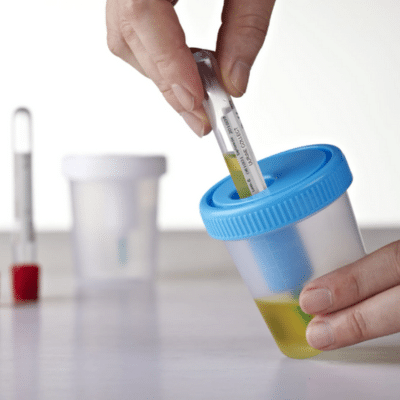At-Home STD & UTI Testing
Simple, Private, Fast Results.
Your reproductive health matters, and getting tested should be easy, private, and accurate. With QuickMed's at-home test kits, you can screen for sexually transmitted infections, urinary tract infections, and other genital health concerns—all from the comfort of your home. No waiting rooms, no hassle—just fast, reliable results so you can take control of your health with confidence.
*A telehealth visit with a licensed provider is required. Must reside in Ohio.

Get Started today!
Taking control of your sexual health has never been easier. With QUICKmed Urgent Care's at-home sexually transmitted infection (STI), urinary tract infection (UTI), and genital health screening kits, you can prioritize your well-being without the stress and discomfort of visiting a clinic.
We are dedicated to providing you with the most accurate, reliable, and confidential testing experience possible. Our service is designed to be user-friendly, with step-by-step instructions, secure delivery, and fast results. If you have any questions or need assistance, our professional team is here to support you every step of the way.
Request your test kit now to enjoy the convenience, privacy, and peace of mind that comes with knowing your health is in good hands.
Why Choose At-Home Testing?
SEXUALLY TRANSMITTED INFECTIONS
Sexually transmitted infections (STIs) are infections that are spread through sexual contact. They can be caused by bacteria, viruses, or parasites. Common STIs include: Chlamydia, Gonorrhea, Syphilis, Human papillomavirus (HPV), Genital herpes, HIV, and Trichomoniasis.
URINARY TRACT INFECTIONS
A urinary tract infection (UTI) is an infection of the urinary tract, which includes the kidneys, ureters, bladder, and urethra.
SEXUAL HEALTH
Sexual and genital health refers to the overall well-being and proper functioning of the external and internal reproductive organs, including the vagina, vulva, penis, and testicles, and encompasses the absence of infections, irritations, or abnormalities that could affect sexual health and overall well-being; it is maintained through good hygiene practices and regular checkups with a healthcare provider to detect any potential issues early on.
Frequently Asked Questions
My test results were positive. What should my partner do next?
If you test positive for an STI, your partner should get tested immediately to determine if they have also been infected and to receive treatment if necessary; they should also inform any other recent sexual partners to get tested as well, as early detection and treatment are crucial to prevent further spread of the infection.
How do STDs/STIs spread?
STDs/STIs pass from one person to another through oral, anal, and vaginal sex, as well as genital skin-to-skin contact.
What are the risk factors for contracting an STD/STI?
- Having anal, vaginal, or oral sex without a condom
- Having multiple sex partners
- Having anonymous sex partners
- Having sex while under the influence of drugs or alcohol can lower inhibitions and result in greater sexual risk-taking
How often should I test for STIs/STDs?
Anyone who is sexually active should get tested every 6 to 12 months. If you have multiple sexual partners, you should get tested more frequently, such as every 3 to 6 months. If you have had condomless sex with a new or casual partner you should test right away.
What is the best way to prevent STDs/STIs?
- Abstaining from vaginal, anal, or oral sex. This is the only way to completely avoid STIs.
- Getting vaccinated. Vaccines are recommended for some people to prevent hepatitis B and HPV.
- Reducing your number of sex partners.
- Regular testing. You and your partner should get tested and share your results.
- Being in a mutually monogamous relationship with a partner who has been tested and does not have an STI.
- Using condoms the right way every time you have sex.

